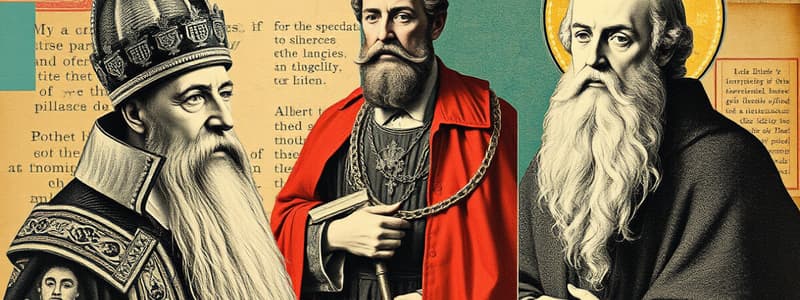Podcast
Questions and Answers
What was Albert the Great's primary contribution to European philosophy?
What was Albert the Great's primary contribution to European philosophy?
- He created new philosophical doctrines.
- He promoted the ideas of Averroism.
- He translated the works of Aristotle into Latin. (correct)
- He established the use of metaphysical reasoning.
What did St. Thomas Aquinas argue against in his controversy with the Averroists?
What did St. Thomas Aquinas argue against in his controversy with the Averroists?
- The multiplicity of human intellects. (correct)
- The moral implications of Aristotle's ethics.
- The cyclical nature of the universe.
- The concept of divine creation.
In which work did St. Thomas Aquinas convey his theological philosophy?
In which work did St. Thomas Aquinas convey his theological philosophy?
- Summa Theologiae (correct)
- Critique of Pure Reason
- The Republic
- Confessions
How does philosophy, according to St. Thomas Aquinas, start its exploration?
How does philosophy, according to St. Thomas Aquinas, start its exploration?
What is a key limitation humans face in understanding God, according to St. Thomas Aquinas?
What is a key limitation humans face in understanding God, according to St. Thomas Aquinas?
Which of the following best describes Aquinas's view on the relationship between philosophy and theology?
Which of the following best describes Aquinas's view on the relationship between philosophy and theology?
What is one of the five proofs of God's existence proposed by Aquinas?
What is one of the five proofs of God's existence proposed by Aquinas?
Why did Church authorities disfavor Aristotle's metaphysics?
Why did Church authorities disfavor Aristotle's metaphysics?
Flashcards are hidden until you start studying
Study Notes
Albert the Great
- Aims to make Aristotle's philosophy accessible across Europe by translating his works into Latin.
- Considers Aristotle the greatest philosopher, influencing subsequent thinkers.
- His admiration for Aristotle significantly impacts St. Thomas Aquinas's philosophical development.
St. Thomas Aquinas
- Engages in a debate with the Averroists, led by Siger de Brabant, who proposed controversial ideas like the eternity of the world and the unity of intellect among humans.
- The Church responded to Averroist propositions by distancing from Aristotle’s metaphysical concepts.
- Thomas counters these views by creating a moderate interpretation of Aristotle suitable for Christian education.
Key Works
- Authored "Summa Contra Gentiles" and "Summa Theologiae," crucial texts in integrating faith with reason.
Philosophy and Theology
- Philosophy starts with sense experience, progressing to broader concepts, eventually contemplating God.
- Theology begins with faith in God and views all existence as divine creation.
- Establishes the mutual reinforcement of philosophy and theology in the search for truth.
Limitations of Human Knowledge
- Acknowledges that human beings cannot fully comprehend God's nature in this life due to limitations stemming from sense experience.
- Divine reality surpasses human understanding capabilities.
- It is innate for the human mind to associate natural effects with their causes, leading to the development of reasoning.
Five Ways (Quinquae Viae)
- St. Thomas presents five arguments as proofs for God’s existence, emphasizing logical reasoning in faith.
Studying That Suits You
Use AI to generate personalized quizzes and flashcards to suit your learning preferences.




